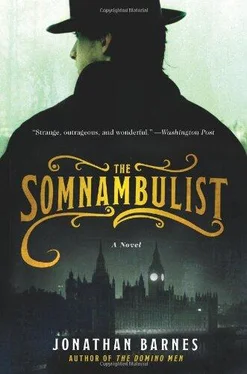Jonathan Barnes - The Somnambulist
Здесь есть возможность читать онлайн «Jonathan Barnes - The Somnambulist» весь текст электронной книги совершенно бесплатно (целиком полную версию без сокращений). В некоторых случаях можно слушать аудио, скачать через торрент в формате fb2 и присутствует краткое содержание. Жанр: Иронический детектив, Исторический детектив, на английском языке. Описание произведения, (предисловие) а так же отзывы посетителей доступны на портале библиотеки ЛибКат.
- Название:The Somnambulist
- Автор:
- Жанр:
- Год:неизвестен
- ISBN:нет данных
- Рейтинг книги:5 / 5. Голосов: 1
-
Избранное:Добавить в избранное
- Отзывы:
-
Ваша оценка:
- 100
- 1
- 2
- 3
- 4
- 5
The Somnambulist: краткое содержание, описание и аннотация
Предлагаем к чтению аннотацию, описание, краткое содержание или предисловие (зависит от того, что написал сам автор книги «The Somnambulist»). Если вы не нашли необходимую информацию о книге — напишите в комментариях, мы постараемся отыскать её.
The Somnambulist — читать онлайн бесплатно полную книгу (весь текст) целиком
Ниже представлен текст книги, разбитый по страницам. Система сохранения места последней прочитанной страницы, позволяет с удобством читать онлайн бесплатно книгу «The Somnambulist», без необходимости каждый раз заново искать на чём Вы остановились. Поставьте закладку, и сможете в любой момент перейти на страницу, на которой закончили чтение.
Интервал:
Закладка:
Barge knocked politely, sauntered in and made a beeline for Mrs. G., immediately clasping her hand in his, as unselfconscious as lovers half their age meeting after a long separation. In fact, they had seen each other at supper barely an hour earlier.
“Have you told him?”
Mrs. Grossmith sighed. “I haven’t had a chance.”
“Told me what?” Moon asked testily.
“I’ve been trying to say ever since I got here, sir. You wouldn’t listen.”
Moon softened. “Then tell me now. You have my full attention.”
“It’s good news.”
“Delighted to hear it.”
When she spoke, Mrs. Grossmith gripped Arthur’s hand all the tighter and the words tumbled out overeagerly, scrambling over one another in their haste to be heard. “Earlier this evening, Arthur did me the honor of asking me to marry him… And I’ve accepted, Mr. Moon, I’ve accepted. I’m going to be his wife!”
There was a moment’s silence. The detective managed a thin-lipped smile. “Well done,” he said eventually, speaking as one might to an old dog who had finally mastered a new trick.
The Somnambulist tried his best to write CONGRATULATIONS but misjudged the length of the word and got in a terrible muddle with his spelling, with the result that it actually read:
CONNGRATT
followed by an indecipherable scrawl.
Mrs. Grossmith understood enough, however, to appreciate the sentiment. “Thank you.”
Barge disentangled himself from his fiancee and stepped up to Moon. “It must seem awful sudden to you,” he began. “We’ve only known one another for a month or so, but something just seemed right between us from the first. We understood each other. And at our time in life you can’t afford to wait, if you catch me meaning. We all deserve some happiness. And I think we’re going to be happy, Emmy and me.”
It was obviously a well-prepared speech. Moon listened as graciously as he was able and, when it was over, added rather pompously: “You have my blessing.”
“Well, thank you, sir,” said Barge. “That means a lot to me. Truly it does.”
Moon turned to his housekeeper. “But am I to understand, whilst these glad tidings mean that Mr. Barge is to gain a wife, that I am to lose a housekeeper?”
Grossmith looked embarrassed. “I don’t… That is, we haven’t decided.”
“I’ve enough to keep us both,” Barge said proudly. “Her skivvying days are over.”
“Well, then, I wish you joy.” Moon turned away and busied himself with clearing up the maps and plans of underground London. “Eggs and bacon, if you please, Mrs. Grossmith. We’ve a long night ahead of us. And I sincerely hope that at the end of it we’ll finally have some answers.”
“Emmy,” he murmured once the couple had left, no doubt to canoodle in the kitchen over a frying pan. “Short, one presumes, for Emmeline… I must confess that, until today, I never even knew that was her name.”
There is something both melancholy and oppressive about a schoolyard at night. Melancholy because one sees only silence and empty space where, according to the natural order of things, there ought to be laughter and movement and learning; oppressive because despite its desolation there is a strong and persistent sense of other people , of strangers present but unseen. Stand alone in a deserted playground at midnight, long after its daytime inhabitants have been tucked in to bed, and it is easy to imagine oneself surrounded by a thousand ghostly schoolboys — easy, too, to glimpse the whirl and bustle of their play, hear the shouts of their games, the thud of ball on bat, the groans of disappointment as the bell calls them back to study. Mr. Skimpole had never been an especially imaginative man — had prided himself, in fact, on his regimented common sense and rigorously practical mind — but even he could feel something of this eerie sensation as he waited alone in the playground of Gammage’s School for Boys.
He had never liked schools, of course, whether fully occupied or not. Evil memories crouched behind the blackboard; they strutted along the cricket pitch and strolled with deceptive nonchalance across the yard, where the spectral outline of a long-abandoned game of hopscotch could still be dimly traced.
He shivered and checked his watch again. They ought to be here by now.
A sudden gust of wind, a cloud edged across the moon and all at once the shadows crowded eagerly about him. Skimpole felt a surge of dizziness and took deep, gulping breaths, but still he felt queasy and uncomfortable. He had no desire to check but he was certain that some of his sores were bleeding. The stains, he reflected, would be impossible to get out.
Over the course of the day, the lesions had grown infinitely worse. He had changed after dinner and found them — flaky, livid, puckering red — covering most of his belly and moving inexorably up his chest, toward his neck. One had already appeared on his face, high on his left temple, though Skimpole was relatively confident that he had managed to disguise it by artful positioning of a stray strand of hair. He hoped that his son hadn’t noticed.
Where were they? They must come soon or he feared they would arrive only to find him sprawled unconscious (or worse) upon the asphalt.
“Hello?” the albino called out to the darkness. He coughed. A small amount of phlegm came up, but the vulgarity of spitting in public having been instilled in him as an infant, he forced himself, with some discomfort, to swallow.
“Hello?” he said again, more gingerly this time. “I’m here. I’m waiting.”
Still nothing. He pulled his coat tighter about him, did his best to remain calm and, not for the first time that day, wondered whether he was truly doing the right thing.
At last he was disturbed by the sound of an unfamiliar voice calling his name. Two strangers stood before him, and he realized with some astonishment that they must have crept up without him hearing, a feat he had long believed impossible.
“Well, chop off my legs and call me Shorty,” said one, peering curiously at Skimpole. “What a deuced queer-looking johnny. I was expecting someone taller. Bit less pale, ruddier of cheek. Weren’t you?”
“Abso-bally-lutely, old chum,” said the other. “He’s a rum ’un and no mistake.”
In all his extensive experience of the weird and grotesque, these two men were by far the most singular individuals Skimpole had ever encountered. The first was big and brawny, the other small and neat, and they spoke in cheerfully upper-crust, well-bred accents, their voices thick with money and casual privilege. But what was most striking about them was the fact that whilst they were evidently well into middle age, both were absurdly dressed in matching school uniforms. They wore identical bright-blue blazers, school ties and gray flannel shorts cut off just above their gnarled and hairy knees. The smaller man wore a little stripy cap.
Skimpole stuttered in disbelief. “Are you really them?” he managed at last.
The big one grinned. “I’m Hawker, sir. He’s Boon. You can call us the Prefects.”
His companion frowned. “Hang it all. That’s my speech you’ve just pilfered. I always say that. It’s practically a tradition.”
“Don’t I know it,” Hawker protested. “About time I had a crack.”
“But we always agreed I’d say it. You’re a wretched sneak to go back on your word. If old Skimpy weren’t here I’d give you a sound hoofing.”
“I’d like to see that, you silly young josser. Little Poggie Thorn and ‘Baby’ Wentworth from the lower fifth could trounce you in a scrap and you jolly well know it.”
“You can be the most priceless idiot sometimes, Hawker.”
Читать дальшеИнтервал:
Закладка:
Похожие книги на «The Somnambulist»
Представляем Вашему вниманию похожие книги на «The Somnambulist» списком для выбора. Мы отобрали схожую по названию и смыслу литературу в надежде предоставить читателям больше вариантов отыскать новые, интересные, ещё непрочитанные произведения.
Обсуждение, отзывы о книге «The Somnambulist» и просто собственные мнения читателей. Оставьте ваши комментарии, напишите, что Вы думаете о произведении, его смысле или главных героях. Укажите что конкретно понравилось, а что нет, и почему Вы так считаете.












